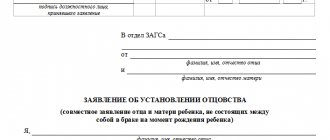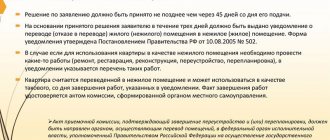Inheritance of certain types of property
has some features.
When inheriting limited negotiable items,
received by the testator with a special permit (for example, weapons), the heir does not require special permission at the time of acceptance of the inheritance. but such permission must be obtained later. If the heir is refused to issue such permission, the ownership of the thing is terminated.
In the event of the death of a participant in a general partnership or general partnership. member of a limited company
or
additional liability,
a member of a production cooperative, his share (share) in the share (authorized) capital of the corresponding organization is included in the inherited property. The heir to whom this share is transferred becomes a participant in these organizations if they agree (otherwise they must pay compensation for the testator's share). The heirs of the investor's share in the limited partnership and shares in the joint-stock company become participants in these organizations. The heir to a share of a member of a consumer cooperative has the right to be accepted as a member of this cooperative.
Individual entrepreneurs and commercial organizations
have a priority right over other heirs to inherit the enterprise if it is part of the inherited property.
Land plot,
belonging to the testator by
right of lifelong inheritable possession
or right of ownership. inherited without the heir obtaining special permission.
If it is impossible to divide a land plot between several heirs due to its limited size, the land plot passes to the heir who has the priority right to receive it, and in the absence of such, the land plot passes to several heirs on the terms of common shared ownership.
Cash deposits,
deposits contributed by a citizen to a credit institution (bank) can be bequeathed either by registering a testamentary disposition directly at this institution or in a will. registered in a notary's office for the entire inheritance.
Right to receive wages. pensions, special insurance benefits
the testator, as well as to receive payments compensating him for harm, belongs to his family members living with him, as well as his disabled dependents, regardless of whether they lived with him or not. Demands for payment of the specified amounts must be presented to the obligated persons within four months from the date of opening of the inheritance.
Property for which there were no heirs is “escheated”
becomes the property of the Russian Federation.
When inheriting property by several heirs, the share of the surviving spouse
will always be greater than the share of the remaining heirs, since the surviving spouse owns half of the property acquired jointly with the testator.
Copyright of persons
who created works of science, literature and art, pass to their heirs only for 70 years.
Kushnir I.V. Civil law. 2010
§ 2. Inheritance of certain types of property
1. Definition. Inheritance of certain types of property is the inheritance of the property of the deceased (inheritance, hereditary property) on the basis of general basic rules, but taking into account the characteristics of a particular type of property.
2. Main features. Chapter 65 of the Civil Code of the Russian Federation establishes some special rules for the inheritance of certain types of property. Including:
a) inheritance of rights related to participation in business partnerships and societies, in production cooperatives. Here, in accordance with the constituent documents of the organization, the inheritance includes the share (share) of the testator, the value of which can be paid to the heirs. The heirs to whom the shares of the joint-stock company have passed become members of the company (Article 1176 of the Civil Code of the Russian Federation);
b) inheritance of rights related to participation in a consumer cooperative. The heirs of a member of a housing, dacha or other consumer cooperative have the right to be accepted as members of the cooperative. Issues related to admission to membership of a cooperative with several heirs, payments to heirs not accepted into the cooperative of amounts due to them, and other similar issues are determined by law and the constituent documents of the cooperative (Article 1177 of the Civil Code of the Russian Federation);
c) inheritance of an enterprise. An heir - an individual entrepreneur or a commercial organization who is an heir under a will, has, when dividing the inheritance, a priority right to receive the inherited enterprise against his inherited share. If none of the heirs has such a right or has not exercised it, the enterprise becomes the common shared property of the heirs (Article 1178 of the Civil Code of the Russian Federation);
d) inheritance of property of a member of a peasant (farm) household. An heir who is not a member of the farm and has not joined it has the right to receive compensation commensurate with his inherited share in the property jointly owned by the farm. The division of farm property occurs only in the case when, after the death of the testator, the farm is terminated (Art.
e) inheritance of things with limited negotiability. The heir of such things must obtain appropriate permission. If the said permit is refused, the item is subject to forced sale, and the proceeds from the sale of the property are transferred to the heir minus the costs of selling the property (Article 1180 of the Civil Code of the Russian Federation);
f) inheritance of land plots. Plots of land that belonged to the testator under the right of ownership or the right of lifelong inheritable possession are included in the inheritance. No special permission is required for their acceptance by the heirs (Article 1181 of the Civil Code of the Russian Federation). Possession, use and disposal of the plot (if none of the heirs has a preferential right to receive the plot or has not used it) is carried out on the terms of common shared ownership. The division of a land plot between several heirs is carried out taking into account the minimum plot size established for plots of the corresponding intended purpose (Article 1182 of the Civil Code of the Russian Federation).
g) inheritance of unpaid amounts provided to a citizen as a means of subsistence. The right to receive such amounts (unpaid wages, pensions, alimony, etc.) belongs and can be obtained within 4 months from the date of opening of the inheritance by members of his family living together with the deceased, as well as his disabled dependents, regardless of their place residence (Article 1183 of the Civil Code of the Russian Federation);
h) property provided to the testator on preferential terms (due to disability, etc.). It is inherited on a general basis (Article 1184 of the Civil Code of the Russian Federation).
The Civil Code of the Russian Federation establishes that state awards, which are subject to the legislation on state awards of the Russian Federation, are not included in the inheritance. Their transfer to other persons is carried out in accordance with the specified legislation. Honorary, memorable and other signs, incl. awards and signs as part of collections are part of the inheritance and are inherited on a general basis (Article 1185).
Inheritance of common household furnishings
The plenum of the Supreme Court of the Russian Federation, held on May 29, 2012, clarified that items of ordinary home furnishings and household items are included in the inheritance and are inherited on a general basis. The preemptive right to items of ordinary home furnishings and household items belongs to the heir who lived together with the testator on the day the inheritance was opened, regardless of the duration of the joint residence.
The dispute between heirs regarding the inclusion of property in such items is resolved by the court, taking into account the specific circumstances of the case (in particular, their use for ordinary everyday household needs based on the testator’s standard of living), as well as local customs. At the same time, antique items, items of artistic, historical or other cultural value, regardless of their intended purpose, cannot be classified as these items. To resolve the issue of classifying objects about which a dispute has arisen as cultural values, the court appoints an examination (Article 79 of the Code of Civil Procedure of the Russian Federation).
According to a number of authors (Barshchevsky M.Yu., Pronina M.G., etc.), it is advisable to use a special order of inheritance of items of ordinary home furnishings and household items. This procedure existed before the adoption of the Civil Code of the Russian Federation. Items of ordinary household furnishings and household items passed to the heirs by law who lived together with the testator for at least 1 year before his death, regardless of the order and inheritance share.
I agree with this point of view Amirov M.S., who believes that the legal regulation of hereditary succession of household furnishings and household items, established in Art. 1169 of the Civil Code of the Russian Federation, which establishes the preemptive right of the heir to receive items of ordinary household furnishings and household items on account of his inheritance share, seems unsuccessful. It infringes on the rights of persons close to the testator, does not meet the requirements of justice, and leads to further destruction of family ties.
According to Sadikov O.N. Art. 1169 of the Civil Code of the Russian Federation determines the procedure for inheriting a certain special part of the testator’s property, and in principle there was no need to separate these provisions into a separate article. The allocation of rules on the inheritance of household furnishings and household items into a separate article is due to the fact that previously an article with the same name was contained in inheritance legislation. Opinion of Sadikov O.N. in this case it seems reasonable and consistent with the spirit of the law.
Currently, the question of what exactly should be understood as items of ordinary home furnishings and household items is very relevant; due to the different standard of living of the testator and heirs, it is difficult to compile any specific list of such items.
Experts believe that the classification of property as household items should be determined by their use for ordinary everyday household needs, and the fact of use is of utmost importance - the property should be used, and not intended for use.
Notarial practice does not classify as items of ordinary home furnishings and everyday use: things used for professional activities (scientist's library, doctor's instruments, musician's instruments, etc.); luxury goods (products made of precious metals, precious stones, expensive furniture, cars, ancient gold and silver coins, etc.).
As an example, we can cite V. Makarov’s claim against K. Semina for recognition of the right to inherit items of ordinary household furnishings.
The plaintiff lived with V.V. Semin (the defendant’s father) from 2007 until his death in June 2009. All property according to the will passed to Makarov and Semina in equal shares. The dispute arose over furniture and household appliances that belonged to Semin V.V. Semin K. demanded their division equally. The court came to the conclusion that the above items are items of ordinary home furnishings and Makarov V. has the priority right of inheritance.
Inheritance of certain types of property
The issue of inheritance of certain types of property requires special consideration. This is due to the fact that when inheriting certain types of property, certain features must be observed.
— Inheritance of rights related to participation in business partnerships and societies, production cooperatives. The inheritance of a participant in a general partnership or a general partner in a limited partnership, a participant in a limited or additional liability company, or a member of a production cooperative includes the share (share) of this participant (member) in the share (authorized) capital (property) of the corresponding partnership, company or cooperative. If, in accordance with the law or the constituent documents of a business partnership or company or production cooperative, the consent of the remaining participants of the partnership or company or members of the cooperative is required for the heir to join the business partnership or production cooperative or for the transfer to the heir of a share in the authorized capital of the business company, and in such consent the heir refused, he has the right to receive from a business partnership or society or production cooperative the actual value of the inherited share (share) or the corresponding part of the property.
The inheritance of an investor in a limited partnership includes his share in the joint capital of this partnership. The heir to whom this share is transferred becomes an investor in the limited partnership. The inheritance of a participant in a joint stock company includes shares owned by him. The heirs to whom these shares are transferred become members of the joint-stock company.
— Inheritance of rights related to participation in a consumer cooperative.
The inheritance of a member of a consumer cooperative includes his share. The heir of a member of a housing, dacha or other consumer cooperative has the right to be accepted as a member of the relevant cooperative. Such an heir cannot be refused membership in the cooperative. Resolving the issue of which of the heirs can be accepted as members of the consumer cooperative in the case when the testator's share has passed to several heirs, as well as the procedure, methods and terms for paying the heirs who have not become members of the cooperative the amounts due to them or issuing property in their place in kind are determined by the legislation on consumer cooperatives and the constituent documents of the relevant cooperative.
— Inheritance of an enterprise. An heir who, on the day the inheritance is opened, is registered as an individual entrepreneur, or a commercial organization that is an heir under a will, has, when dividing the inheritance, a preferential right to receive the enterprise included in the inheritance against his inheritance share.
In the event that none of the heirs has the specified priority right or has not taken advantage of it, the enterprise included in the inheritance is not subject to division and goes into the common shared ownership of the heirs in accordance with the inheritance shares due to them, unless otherwise provided by agreement of the heirs who accepted inheritance, which includes the enterprise.
— Inheritance of property of a member of a peasant (farm) household. After the death of any member of a peasant (farm) household, the inheritance is opened and inheritance is carried out on a general basis. If the heir of a deceased member of a peasant (farm) enterprise is not himself a member of this enterprise, he has the right to receive compensation commensurate with his inherited share in the property that is in the common joint ownership of the members of the enterprise. The period for payment of compensation is determined by agreement of the heir with the members of the household, and in the absence of an agreement by the court, but cannot exceed one year from the date of opening of the inheritance. In the absence of an agreement between the members of the household and the specified heir otherwise, the share of the testator in this property is considered equal to the shares of other members of the household. If the heir is accepted as a member of the farm, the specified compensation is not paid to him. In the case when, after the death of a member of a peasant (farm) holding, this holding is terminated, including due to the fact that the testator was the only member of the holding, and among his heirs there are no persons who wish to continue running the peasant (farming) holding, the property the peasant (farm) holding is subject to division among the heirs.
— Inheritance of things with limited defense capability. Weapons, potent and poisonous substances, narcotic and psychotropic drugs and other things with limited defensive capabilities that belonged to the testator are included in the inheritance and are inherited on a general basis with some peculiarities. No special permission is required to accept an inheritance that includes such things. Measures to protect limitedly defensible items included in the inheritance until the heir receives special permission for these items are carried out in compliance with the procedure established by law for the relevant property.
If the heir is refused to issue the said permit, his ownership of such property is subject to termination, and the proceeds from the sale of the property are transferred to the heir minus the costs of its sale.
Inheritance of land plots. The land plot owned by the testator or the right of lifelong inheritable ownership of the land plot is included in the inheritance and is inherited on a general basis with some features. No special permission is required to accept an inheritance that includes the specified property.
When inheriting a land plot or the right to lifelong inheritable ownership of a land plot, the surface (soil) layer, closed reservoirs, forest and plants located on it are also inherited.
— Features of the division of land. The division of a land plot owned by heirs under the right of common ownership is carried out taking into account the minimum size of a land plot established for plots of the corresponding intended purpose. If it is impossible to divide the land plot, the land plot passes to the heir who has the priority right to receive this land plot against his inherited share.
In the event that none of the heirs has a preferential right to receive a land plot or has not exercised this right, possession, use and disposal of the land plot are carried out by the heirs on the terms of common shared ownership.
— Inheritance of unpaid amounts provided to a citizen as a means of subsistence. The right to receive wages and equivalent payments, pensions, scholarships, social insurance benefits, compensation for harm caused to life or health, alimony and other sums of money that were payable to the testator, but were not received by him during his lifetime for any reason, provided to a citizen as a means of subsistence, belongs to the members of his family who lived together with the deceased, as well as to his disabled dependents, regardless of whether they lived together with the deceased or did not live.
Types of inherited property
The legislator regulates the inheritance of certain types of property with all their features, and also establishes its own procedure for each individual case. There are certain variations in the matter of inheritance.
Real Estate Inheritance
When the testator was the owner of an entire organization, the recipient of the inheritance can count on ownership of the entire complex. This will also include all components of the company, from equipment to land.
Not only an individual, but also legal entities can become an heir. It is necessary to submit to the notary all documents and financial statements on the activities of the organization. As well as the results of the assessment examination.
Although in some cases, land holdings may be considered a separate type of property and not be inherited with the enterprise. The land under the building can be privatized directly by the heir.
Intellectual Property Inheritance
All intellectual activity in our country is protected at the legislative level. And it is an object of inheritance. Such objects can be created as a result of technical developments, and also be works of art.
But only the rights to use a specific intellectual object can be inherited. If we are talking about personal non-property rights, then they cannot be inherited. This means that the citizen who inherited them does not have the opportunity to use them, but only to protect their interests.
Unreceived amounts of money
Each person in the course of his life receives certain monetary benefits and wages. When a person dies and he has some unpaid compensation left, they are subject to inheritance to members of his family. But in order to be able to receive such financial assistance, you will need to contact specialized institutions.
USEFUL INFORMATION: Land plot or apartment for large families in 2021
Household objects
The legislator includes all items that a person used in everyday life into this category. The exception in this case will be valuable items and antiques. Such things should be transferred first of all to the person who lived with the deceased.
When the entire apartment is transferred to the heir by inheritance, according to the will, he has the right to keep the household items in it for his use.
Winning
When it comes to legal inheritance, such a category of inheritance as winnings will be divided among all heirs in equal shares. If there is a will, everything will depend on who the testator decided to leave this inheritance to.
It is also worth noting that any winnings cannot be used to repay the deceased’s debts to creditors.
If the will does not contain specific information regarding the exact owner of the lottery tickets or bonds, the amounts will be distributed among all heirs. This option is considered the most common.
Awards and signs from the state
Any rewards can be divided into two types. And the first of them will be subject to the order of the law. The second type is not included here. This will include anniversary medals and badges.
Therefore, those awards that are protected by law will not be subject to inheritance. They can only be transferred to the closest relatives for safekeeping. And those belonging to the second type can be inherited on a general basis.
Finance
Any financial contributions may be subject to inheritance both under a will and without one, as well as by special order. It must be drawn up at the bank directly with the participation of the testator himself. Such a document does not require notarization. It simply indicates the citizen to whom the cash deposit should go after the death of its owner.
If we talk about the legality of inheritance, then half of such a contribution should be transferred to the spouse of the deceased, while the second part is divided among the heirs according to the order.
There will be restrictions on children's age. A child will be able to use his right to dispose of the deposit only after he reaches 18 years of age. When the deposit is considered unclaimed, it will become the property of the state.
When inheriting certain types of property, income tax will not be levied on heirs.
When a situation arises when it comes to inheriting certain types of property, it is quite difficult to understand all the intricacies of this issue. Therefore, in some situations it would be a good idea to seek the help of a professional lawyer.
Peculiarities of inheritance of certain types of property: complex cases of inheritance
Not only real estate and cars, but also other types of property can be inherited, and the transfer of many of them requires special legal regulation. Peculiarities of inheritance of certain types of property are regulated by main article 65 of the Civil Code.
Dear readers! The article describes typical ways to solve legal problems. Your case is individual.
It describes in detail how ownership of 10 types of special material assets is transferred. The law regulates the transfer of property that may cause disputes between heirs, as well as that which cannot be divided among several recipients.
Division of gifted and inherited property of spouses during division of property.
Property donated personally to a spouse or passed to him by inheritance belongs to that spouse and is not subject to division.
If you divide the gifted property, then in court it will be necessary to prove that the property was gifted to you personally and not to the family. To prove this fact, you can present witness statements, a gift agreement, a receipt and other similar evidence.
If the second spouse has made inseparable improvements to the donated property or property passed to you by inheritance, then he has the right to compensation for half of the costs incurred.
Return to menu
Rules for inheritance of limited negotiable items
Inheritance issues are often resolved quite acutely
Difficulties arise when inheriting items whose circulation is limited by law: weapons, narcotic and psychotropic drugs, toxic and dangerous substances, etc.
If the testator had permission to own and store them, he has the right to transfer these items to the heir by will or in the general order. The heir accepts restricted items along with the rest of the inheritance, but he must prove that he has the right to keep them.
For example, he will have to obtain a weapons permit or prove that he must take a restricted medication as prescribed by a doctor. If he cannot do this, then the items will be confiscated, and their value will be compensated to the heir after evaluation.
About certain features of inheritance - in the legal video:
Mandatory share in inheritance by law
The concept of a mandatory share is applicable to inheritance under a will. There is a category of compulsory heirs, whose interests are protected at the legislative level. We are talking about the testator's dependents, which include:
- minor children;
- incapacitated spouse;
- elderly parents.
Important! The testator does not have the right to deprive a dependent of a share in the inheritance. If he does not indicate a mandatory heir in the will, the latter can challenge the document through the court, achieving the allocation of part of the inheritance. The size of the obligatory share is 50% of the property that a citizen would inherit by law.
If there is no will, and the distribution of the inheritance occurs in the order of legal priority, then the compulsory heirs receive the assets on an equal basis with other claimants. For example, after the death of a citizen, the first-line successors were his children, his wife and his elderly mother, to whom he provided financial assistance. If the deceased had made a will without naming his mother in it, she could have secured a compulsory share. Since there is no order, all first-degree successors inherit the assets equally.
Like any other claimant to an inheritance, a compulsory heir may be found unworthy. The grounds for this are specified in Article 1117 of the Civil Code of the Russian Federation. Citizens are recognized as unworthy heirs through the court and lose the right to inheritance.
Inheritance of sums of money provided to a citizen
Unreceived funds are transferred to family members
If a citizen for some reason has not received the amount of salary due to him. pensions, scholarships, alimony, etc. they can be transferred as follows:
- The right to unpaid sums of money during life passes from the deceased to family members living with him. They can also be received by dependents of the deceased, regardless of their place of residence.
- Family members of the deceased and his dependents must declare their rights to these amounts within 4 months after the opening of the inheritance.
- If the deceased lived alone and had no dependents, then all unpaid amounts must be included in the general inheritance and transferred to the heirs in order of priority or by will.
It often happens that family members of the deceased do not know about the unpaid amounts or do not have time to declare their rights before they are transferred by inheritance. In this case, you can go to court. If a valid reason for late application can be confirmed, the money can be received in accordance with the procedure established by law.
What is included in the hereditary mass
Inheritance involves the process of transferring the rights and obligations of a deceased person (testator) to the heirs. By way of inheritance, property rights, obligations, as well as products of legal relations associated with authorship or invention are transferred. All this is covered by the concept of “inherited mass” (“inherited property”).
Inherited property is a complex of property/non-property rights and obligations of the testator that are transferred to other persons through inheritance.
Rights and obligations directly related to the personality of the testator cannot be included in the inheritance. For example, awards given to a citizen or his obligation to pay monthly child support.
The inherited property may include:
- real estate: house, apartment, land, dacha;
- movable property: car, furniture, jewelry, money and other assets;
- rights (the right to collect debts from the debtors of the testator);
- obligations (the need to pay off the testator’s creditors).
All rights to the property of the testator must be properly formalized, and the citizen must be the owner of his things, rights and obligations.
Read more about what is hidden under the concept of hereditary mass.
Rules for inheritance of land plots
If the testator owned a plot of land. it will be inherited on a general basis and will be included in other property. In this case, the heir receives ownership not only of the land itself, but also of the forest, ponds, plants, etc. located on it.
No special permission is required, but difficulties may arise if there are several heirs and their share is not specified separately in the will. In this case, the land plot will be inherited in accordance with the following principles:
- The plot can be divided in accordance with the minimum size of the land plot for a given purpose. In other words, it is impossible to divide the land into parts that will be impossible to use in the future, even if there are several heirs.
- If the plot cannot be divided, it passes entirely to one heir who has the preemptive right. Other heirs must receive financial compensation for their share.
- If none of the heirs has a preemptive right, the land plot becomes common, and each of the heirs will own it on the basis of shared ownership.
Most often, the heirs simply agree among themselves: one of them takes ownership of the entire land plot and pays a share to the other heirs. Dividing land is often unprofitable, since the size of the plot may not be sufficient for construction or other use.
Business inheritance
This issue is regulated by the Civil Code in the following articles:
- 132.
- 1178.
Clause 1 of the above article discusses objects of inheritance, and clause 2. – character and conditions.
In this case, an enterprise is inherited , referred to as a property complex - real estate. It must carry out business activities. Then the enterprise is recognized as an object of inheritance, and the complex is recognized as real estate.
In order to inherit an enterprise, the heir must be registered as an individual entrepreneur of the enterprise. Such an action must be completed at the time of opening the enterprise itself and documented.
If the heir is a commercial organization , then the division of the inheritance occurs in shares. If neither an individual nor a legal entity can act as an heir, and otherwise is not provided for by reason of the agreement, then the inheritance of the enterprise occurs in shares.
Rules for inheritance of participation in companies, partnerships and cooperatives
A share in an LLC is also considered inherited property
If the testator was the owner of a share in the LLC. consumer cooperative or any partnership, this share is also considered property that can be inherited. In this case, two options are possible: either the heir receives a share in the authorized capital and becomes a full member of the company, or this share is bought from him by other participants.
If the testator owned shares, the rights to them also pass to the heirs: they become full members of the joint-stock company. If the testator had a share in the cooperative, then the heir will similarly be accepted into the cooperative or may sell the received inheritance to other shareholders.
It is more difficult to resolve the issue of inheritance of enterprises and organizations if the testator owned an individual enterprise or was the owner of a company. In this case, if among the heirs there are individual entrepreneurs, or the official heir is a legal entity, they have a priority right to receive this part of the inheritance.
How does inheritance of escheated property occur - procedure
There are often cases when property belonging to a person passes to the state after his death. In this case, he is called escheat.
Reasons to consider property escheat:
- no heirs;
- they refused to inherit;
- they were disinherited or deemed unworthy;
- No one accepted the inheritance.
How does the state process escheated property of a particular type when refusing an inheritance?
Action 1. Sending a certificate of the state’s right to inheritance to the Federal Tax Service inspection
When it turns out that a deceased person has some valuable property that requires transfer by inheritance, and the heirs refused to accept it, a notary gets down to business. He finds out all the circumstances and prepares an inventory of all the goods.
If no one else has claimed their rights within six months, he sends to the tax office a certificate confirming the state’s ownership of the identified inheritance.
Action 2. Valuation of escheated property
The tax inspectorate evaluates all this escheat property in order to determine its value, inventory it and turn it into the property of a particular state or municipal entity. The assessment is carried out according to approved methods.
Action 3. Transfer of property into municipal ownership
As a rule, residential and non-residential buildings and land plots are transferred to municipal authorities for their further use as social housing, social and cultural facilities or for sale. Items that are not real estate are transferred to the treasury of the Russian Federation, including cars and other equipment.
Action 4. Sale of property at auction
If the municipality does not plan to use the property, it has the right to put it up for auction and sell it on a competitive basis. The proceeds are credited to the municipal budget and replenish its revenue. Sale through the bidding procedure is mandatory.
To find out how to return escheated property, I suggest watching the video.
Inheritance of a cash deposit
If the testator has opened a deposit in a bank, he has the right to pass it on by inheritance, like other property. However, in this case there are a number of special subtleties:
- To transfer the deposit to an heir after death, it is necessary to draw up and have a will certified by a notary or prepare a written order to the bank. In the first case, you will have to pay a fee and notary services.
- A will can be open or closed. In the first case, two copies are drawn up: one is kept by the notary, the second by the testator. In the second case, the text is sealed in an envelope and, in the presence of two witnesses, is handed over to a notary, who puts his signature on it.
- The envelope will be opened only after the death of the testator; before that, the contents of the will will not be known to anyone.
- The will indicates all the heirs to whom the contribution will be transferred, and their shares must be indicated.
Important! If the contribution was made during the marriage and it was not specified in the marriage contract, the testator is entitled to only half the amount. The contribution will be considered joint property, and the spouse can independently dispose of his share.
How to receive money from a relative's will
Money, along with apartments and houses, is a common subject of wills. It is not always the case that finances remain in the form of cash after the deceased. More often than not, savings are kept in an open deposit account at a bank.
Inheritance of deposits occurs in two ways:
- like ordinary property, through a will;
- through a testamentary disposition drawn up in the bank.
Quite often, elderly people, thinking about the fate of their loved ones, not only open a bank account, but also draw up a testamentary disposition regarding the accumulated assets. A will certified by a bank employee is equivalent to an order certified by a notary.
If a citizen has not drawn up an order with the bank, then, by drawing up a written declaration of will with a notary, he has the right to bequeath the deposit funds to children, relatives or other persons.
But it also happens that the heirs become aware of the presence of a bank deposit only after the opening of the inheritance.
The deposit contribution is inherited in accordance with the general rules. However, a testator connected by marriage can only dispose of half of the contribution.
According to the Family Code of the Russian Federation, these funds are jointly acquired property.
When inheritance occurs by law, there is confusion about how to obtain the contribution after the death of the investor without a will.
First of all, the heir must obtain a certificate of inheritance from a notary. In addition, you will need a savings book or a deposit agreement.
With these documents you need to go to the bank, where they may additionally request a document confirming the relationship.
After 6 months, the heir has the right to receive the money in his hands or leave it in the current account, but register it in his name. Read more about how to receive money after the death of a relative.
Other cases of transfer of property by inheritance
Most often, disputes arise during the division of real estate.
If the testator had any intellectual property - the right to a scientific discovery, a work of art, etc., it can also be inherited. However, in this case, the right to dispose of intellectual property and protect copyrights will remain with the heirs only for 70 years after the death of the testator.
It is important to know what state awards are. as well as memorable and honorary signs cannot be included in the inheritance according to the law. After the death of the owner, they become the property of the state.
Who will get the property if there are no heirs, or if they all renounced the right to inheritance? According to Art. 1151 of the Civil Code of the Russian Federation, in this case the property will be recognized as escheated, and it will become the property of the state. If we are talking about real estate, it will move to the municipal housing stock, other property will become the property of the Russian Federation.
In complex cases, disputes between heirs are resolved in court. It is necessary to declare your rights to the inheritance within six months after the death of the testator, after which the ownership rights of the identified heirs will be recognized.
Tell your friends! Share with your friends! Write about this material on social networks using the buttons below. Thank you very much!
Cheat sheets for your phone are an indispensable thing when taking exams, preparing for tests, etc. Thanks to our service, you get the opportunity to download cheat sheets on civil law to your phone. All cheat sheets are presented in popular formats fb2, txt, ePub. html, and there is also a java version of the cheat sheet in the form of a convenient application for a mobile phone, which can be downloaded for a nominal fee. Just download the cheat sheets on civil law - and you won’t be afraid of any exam!
Did not you find what you were looking for?
If you need an individual selection or custom work, use this form.
Next question »
Common property – ownership of the same property by several persons at the same time
Inherited money
In addition to accepting various forms of business by inheritance, there are other features of inheritance of property. One of them is the possibility of accepting, after the death of a loved one, his financial assets, which include cash, bank deposits, as well as payment obligations towards the giver from third parties.
One type of inherited property is a bank deposit. Heirs can receive it only after obtaining a certificate of entry from a notary. To do this, you need to provide the lawyer with information about the deposit and the following documents:
- Banking service agreement.
- Load book.
But these documents are not always available to the relatives of the deceased. If applicants know that the giver had a deposit, then the notary should be told about this. The specialist has the legal right to send a request to the specified bank about the availability of a deposit.
The personal rights of the deceased, for example, to alimony received by him, are not inherited. But you can inherit the debts of a deceased person. According to Article 1175 of the Civil Code of the Russian Federation, successors who have entered into the property must pay off obligations in an amount not exceeding the value of the property accepted.
FEATURES OF INHERITANCE OF SEPARATE TYPES OF PROPERTY
Inheritance of certain types of property has some features.
When inheriting limited-transferable items received by the testator with a special permit (for example, weapons), the heir is not required to have a special permit at the time of acceptance of the inheritance, but such permission must be obtained later. If the heir is refused to issue such permission, the ownership of the thing is terminated.
In the event of the death of a participant in a general partnership or a general limited partnership, a participant in a limited or additional liability company, or a member of a production cooperative, his share (share) in the share (authorized) capital of the corresponding organization is included in the inherited property. The heir to whom this share is transferred becomes a participant in these organizations if they agree (otherwise they must pay compensation for the testator's share). The heirs of the investor's share in the limited partnership and shares in the joint-stock company become participants in these organizations. The heir to a share of a member of a consumer cooperative has the right to be accepted as a member of this cooperative.
Individual entrepreneurs and commercial organizations have a priority right over other heirs to inherit an enterprise if it is part of the inherited property.
A plot of land that belonged to the testator under the right of lifelong inheritable possession or right of ownership is inherited without the heir obtaining special permission.
If it is impossible to divide a land plot between several heirs due to its limited size, the land plot passes to the heir who has the priority right to receive it, and in the absence of such, the land plot passes to several heirs on the terms of common shared ownership.
Monetary deposits made by a citizen to a credit institution (bank) can be bequeathed both by registering a testamentary disposition directly at this institution, and in a will executed in a notary's office for the entire inheritance.
The right to receive wages, pensions, special insurance benefits of the testator, as well as to receive payments compensating him for harm, belongs to his family members living with him, as well as his disabled dependents, regardless of whether they lived with him or not. Demands for payment of the specified amounts must be presented to the obligated persons within four months from the date of opening of the inheritance.
Property for which there are no heirs is “escheated” and becomes the property of the Russian Federation.
When property is inherited by several heirs, the share of the surviving spouse will always be greater than the share of the remaining heirs, since the surviving spouse owns half of the property acquired jointly with the testator.
The copyright of persons who created works of science, literature and art passes to their heirs only for 70 years.
Judicial division of marital property.
The last method of dividing property. Of course, this does not apply to contractual agreements. It is used when under no circumstances it was possible to reach an agreement. Unfortunately, this is a frequently practiced method of dividing jointly acquired property.
With it, you need to clearly understand that the court divides the property in equal shares, the calculation of property is carried out literally to the penny.
All property involved in the division is subject to assessment. As per the directions of the Supreme Court, only market valuation of the property is applicable. The assessment is carried out in specialized expert organizations. First, such an assessment is made by the Plaintiff, that is, the party to the process who applied to the court for division. The defendant may disagree with the pre-trial assessment of the property and ask the court to order an appraisal of the market value of a particular property.
By going to court, the Plaintiff asks the court to divide the property according to the option he has chosen. The defendant, in his Objections to the Claim, provides the court with his version of the division. The final word belongs to the court. The court evaluates all the options proposed by the parties to the process and chooses the most suitable and acceptable.
A legal dispute can last a long time, for example, up to a year. But there are no countries in the world where such processes would last quickly.
Disputes that arise between spouses during legal proceedings on the division of property are mainly related to the exclusion of any of its types from the mass of property. The party is trying to prove that some of the property cannot be divided, since it was purchased with the personal funds of this participant in the process, or with the money of the parents. Some credit obligations or loan agreements taken by one of the parties to the process come up. It turns out that some property has already been illegally sold by the spouse (for example, a car). It also turns out that one of the spouses closed the deposit and withdrew all the funds. All circumstances are clarified by the court and ultimately a decision is made on the merits.
The most expensive and time-consuming method of dividing property. But it is the only thing people can resort to if such disputes arise. Besides, everything comes to an end, and so do lawsuits. The method is effective and, in many cases, the only one possible for a person.
How to divide the property of an individual entrepreneur when dividing the property of spouses?
The law does not provide for the division of property of a citizen as an individual entrepreneur and as an individual.
According to Art. 24 of the Civil Code of the Russian Federation, a citizen is liable for his obligations with all the property belonging to him, with the exception of property on which, in accordance with the law, cannot be levied. Consequently, an individual can acquire ownership of real estate only in the status of an individual, but not an individual entrepreneur. Ownership of something does not depend in any way on the acquisition or termination of the status of an individual entrepreneur. This is one of the main differences between the two forms of entrepreneurial activity - a legal entity and an individual entrepreneur.
Thus, if one of the spouses is an individual entrepreneur, then everything that he acquired for running a business is divided between the spouses according to the general rule, i.e. equally. The court may award property that the entrepreneur uses exclusively for business purposes, but the entrepreneur spouse must pay half the value of such property to the second spouse as compensation.
Return to menu
How to divide a spouse's car when dividing property?
A car is subject to division, like any other movable property. There are two possible section options here:
The car remains with one spouse, and he pays half the cost of the car to the second spouse;
The car is sold and the proceeds from the sale are divided between the spouses.
Claims and general debts
The property that is subject to division also includes the rights of claim and common debts of the spouses. The division of such property is carried out according to general rules. So, according to paragraph 3 of Art. 39 of the RF IC, the common debts of the spouses when dividing the common property of the spouses are distributed between the spouses in proportion to the shares awarded to them.
Shares, shares, stocks that make up the joint and authorized capital of business companies and partnerships are subject to division. The constituent documents of some of them may provide for mandatory labor participation in their activities. It seems that the shares, bonds, and other securities included in the marital property should be divided not according to their nominal value, but according to the value in accordance with the stock quote that they have at the time the dispute is considered in court. The nominal value can be used as a basis for valuation only if certain shares are not listed on the stock exchange.
Return to menu








